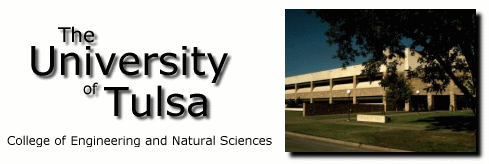
Advising Office
| UNIVERSITY OF TULSA PREMED GUIDELINES |
| Contact: Dr. Richard L. Reeder: richard-reeder@utulsa.edu |
| or Dr. Mark Buchheim: mark-buchheim@utulsa.edu |
| or Dr. Estelle Levetin: estelle-levetin@utulsa.edu |
| Information can be obtained at http://www.aamc.org (allopathic medicine) http://www.aacom.org (osteopathic medicine) http://www.opted.org (optometry) http://www.adea.org (dentistry) http://www.aavmc.org (veterinary medicine) NOTE: Much of the information provided here applies to all professional schools including dental, optometry, and veterinary. Application services and admissions tests vary by profession. There is some minor variation in coursework requirements and we deal with these by individual advising of students depending on interest. Medical schools require the MCAT (medial college admissions test), Dental schools require the DAT(dental aptitude test), optometry schools require the OAT (optometry aptitude test) and most vet schools require the GRE (graduate record exam). These are usually taken in the spring or summer of application year. For more details on specific differences please contact Dr. Reeder or Dr. Buchheim. |
| Choice of major: Medical schools do not care about choice of major as long as a student has the prerequisite courses. Most premeds are biology or biochemistry majors but other common majors include chemical engineering, psychology, and English. Usually it is best if a student majors in something they are good at and that they like. |
| Residency: There are very strong state residency restrictions. Most state schools take none or few non-residents so that any applicant has a better chance of going to med school in their home state. Private schools do not have such restrictions but accepted applicants generally have higher grade point averages and MCAT scores because they have a nationwide applicant pool. Non U.S. citizens must have a green card to apply to most state medical schools. |
| Admission Statistics and Selection Factors: The average MCAT score at state schools is running around 30 and the grade point average is around 3.6 to 3.8. Stats are higher for private medical colleges and for out of state residents. Other factors include letters of recommendation, an interview, and health related volunteer work or health related employment and community service. Undergraduate research is essential for application to MD/PhD programs. Healthcare volunteer experience is extremely important. For predental students, experience in a dental practice is essential. For Veterinary students, experience in a veterinary clinic is essential. |
| Advising: Premed (preprofessional) advising at T.U. is housed in the Office of the Dean in the College of Engineering and Natural Sciences no matter what the student's major. A biology premed will automatically be assigned an advisor. Students in other majors should see Dr. Richard L. Reeder to be assigned a premed advisor. In this latter instance a student will have an academic advisor in his/her major and a premed advisor as well. |
|
Prerequisite courses:
Most schools have general humanities requirements to include coursework in psychology,
anthropology, sociology, etc. Most require 2 semesters of English (a few require 3). Most schools recommend advanced
coursework in biology such as histology, cellular biology, comparative vertebrate anatomy, embryology, genetics,
microbiology, and physiology. Some medical schools around the country now require biochemistry and/or genetics and a
few require calculus or statistcs. |
| Science Courses which all premeds at T.U. should take are as follows: Biology 1603 and 1601 (Intro to Organismic & Evolutionary Biology) Biology 1703 and 1701 (Intro to Cell & Molecular Biology) Bilogy 2124 (Genetics) Chemistry 1013 and 1011 (General chem I) Chemistry 1023 and 1021 (General chem II) Chemistry 3013 and 3011 (Organic chem I) Chemistry 3023 and 3021 (Organic chem II) Physics 1013 and 1011 (Introductory Phyics I) Physics 1023 and 1021 (Introductory Physics II) Note: This is algebra/trig based physics; calculus based physics will also suffice (Physics 2053 & 2051 and Physics 2063 & 2061) |
|
MCAT (medical college admissions test)
The test is scored from 0 to 15 on the first three sections; the essays are not given a numerical score. Composite scores are running around 30 at state medical schools and somewhat higher at private
schools (This would be the equivalent of a 10 on each of the first three sections) |
| DAT (dental aptitude test) The DAT is an online exam, available year round. It has four main areas with subsectons: Natural Sciences Perceptual Ability Reading Comprehension Quantitative Reasoning |
| OAT (optometry aptitude test) The OAT is an online exam, available year round. It has four main areas: Survey of the Natural Sciences Reading Comprehension Quantitative Reasoning Physics |
| Application: Students apply to medical school through a national application service. Allopathic and osteopathic colleges each have a centralized application service. Dental and Veterinary schools have their own application services as well. The University of Texas system has its own application center for medical and dental school. Application is now done on line, usually starting in May. Most students apply to about 5-7 schools. As for Recommendations, most schools prefer to get a committee letter. Some students elect to send individual faculty letters, but most students go through the committee. The University of Tulsa has such a committee. Packets are available in the Advising Office (KEP M205) and the Biology & Chemistry Offices. This process begins in March prior to the summer of application. The committee consists of: Dr. Richard Reeder (chair), Dr. John DiCesare, Dr. Mark Buchheim, Dr. Ron Bonett, Dr. Estelle Levetin, Dr. Paul Baures, Dr. Robert Sheaff, Dr. Bill Potter, and Dr. Scott Holmstrom. |
© 1997 - 2007 Engineering and Natural Sciences College
The University of Tulsa
800 South Tucker Drive
Tulsa, OK 74104
Phone: 918.631.2478
Webmaster: ens-webmaster@utulsa.edu